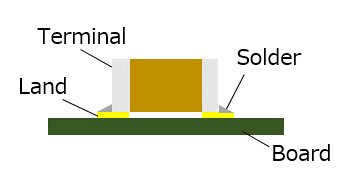UCHS30A08 2.Production
Schottky barrier diodes are not PN junctions, but diodes that utilize potential barriers between semiconductor materials and metal electrodes, e.g., Schottky barrier. They have lower forward voltage (VF) characteristics and shorter reverse recovery time (trr) than typical PN junction diodes, making them suitable for switching operation. However, the reverse current (IR) is larger than that of conventional PN diodes.
Application
- Power supplies
- Industrial Equipment
Specifications
| Series | TU |
|---|---|
| Outline |
TO-263LP |
| VRRM [V] | 80V |
| Io [A] | 30.0A |
| IFSM [A] | 250.0A |
| IR [mA] | 0.100mA |
| VFM [V] | 0.79V |
| @IFM [A] | 15.0A |
| Operating Temperature Range | -40℃ ~ 150℃ |
| Rth(j-c) [°C/W] | 1.50°C/W |
| Connection type | E |
| Packaging style | Reel |
| Quantity per Package | 2000 |
| Weight | 0.590g |
Remarks
Low-IR type
Packaging Specifications
| Packaging style | Reel |
|---|---|
| Quantity per Package | 2000 |
| Weight | 0.590g |
Engineering Documents
Product Specification / Drawing
 UCHS30A08-file.pdf (1363.84KB)
UCHS30A08-file.pdf (1363.84KB)
3D Models
 STEP_LPTO263.zip (52.73KB)
STEP_LPTO263.zip (52.73KB)
FAQ
View AllAll values except for the graph of Junction capacitance vs. Reverse Voltage of SBD products are maximum values, which are guaranteed. Graphs of Junction capacitance vs. Reverse Voltage show typical values (TYP). The curves of the average forward current rating are formed by connecting points where the junction temperature reaches 150℃.
MSL standards are defined for SMDs to be reflow-soldered, and all Kyocera products are MSL: 1. (No need for damp proof packing)
Related Glossary
View AllDiodes utilizing potential barrier (schottky barrier) formed at a junction between metal electrode and semiconductor.
Related Products Discretes Schottky Barrier Diodes(SBD) FRD/SBD Modules
[Diode]Allowable peak reverse voltage repetitively applicable to diode.
[Thyristor]Allowable peak reverse voltage repetitively applicable between anode and cathode.
[Diode] Maximum average forward current of commercial frequency (50Hz/60Hz) sin wave under condition.
[Thyristor] Maximum average on-state current of commercial frequency (50Hz/60Hz) half sin wave under specified condition.
Abbreviation of Surface Mount Technology. A method of producing electronic circuits on a printed circuit board (PCB) by applying solder paste and placing components on the PCB's surface before the solder is melted in a reflow oven.

Range of ambient temperature while not operating.

 Stock Check
Stock Check



